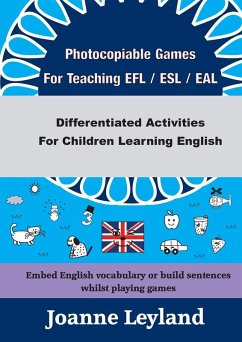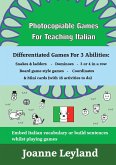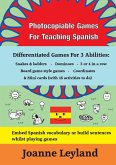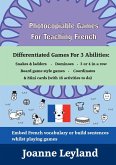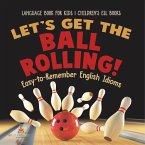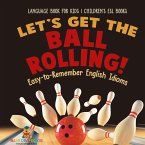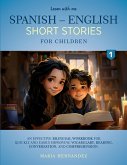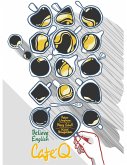Games are a great way to engage pupils so they have fun whilst they are learning new vocabulary or sentence structures. Throughout this book each topic has a variety of fantastic games and the learning activities have been differentiated to suit classes of different abilities. The games have been colour coded according to the amount of English words that appear in the games. "Green" is for the lower ability group, "yellow" is for the middle ability group, and "red" is for the higher ability group. At the front of the book you will find a detailed plan of which English words each ability group has for each topic. The 8 great topics in this fantastic book include pet animals, numbers, fruit, transport, drinks, food, clothes and weather. The games can be played to learn / revise English vocabulary or the pupils can practise sentence structures as they play the games. For each topic there are suggestions of how to form different types of sentences / questions using the words in that topic. These reference pages show pupils how they can progress their knowledge of English further. The teacher could either choose one of the structures for a group to practise or let the pupils choose themselves what structures to practise. The fantastic games include: snakes and ladders, dominoes, 3 or 4 in a row, board game style games and coordinates. For each game there is a useful English vocabulary list, many with pictures, for all the words the pupils need for that game. Each topic has a mixture of games for 3 different ability groups. Within this book there are mini cards to photocopy for each topic. At the back of the book you will find instructions for 16 fun activities to do with the mini cards: the pairs card game, guess the word etc. For the games using the mini cards you can decide if you want the whole class to have all the cards or if you ask groups to focus on the words outlined in the detailed vocabulary plan for their group. Once photocopied the games are an excellent classroom resource that can be used time and time again. The games are ideal for pupils aged 7 - 14 but they may also interest children of other ages who are learning English. The fantastic games have been created by Joanne Leyland, a qualified teacher, with 20 years experience in teaching languages to children. Also available by the same author: English Colouring Book For Children Ages 3-7; English For Kids Ages 5 - 7; Cool Kids Speak English - Books 1, 2 & 3; Fun Word Search Puzzles; English Word Games; First Words In English - 100 Words To Colour & Learn; Learn To Read English As You Colour
Hinweis: Dieser Artikel kann nur an eine deutsche Lieferadresse ausgeliefert werden.
Hinweis: Dieser Artikel kann nur an eine deutsche Lieferadresse ausgeliefert werden.

